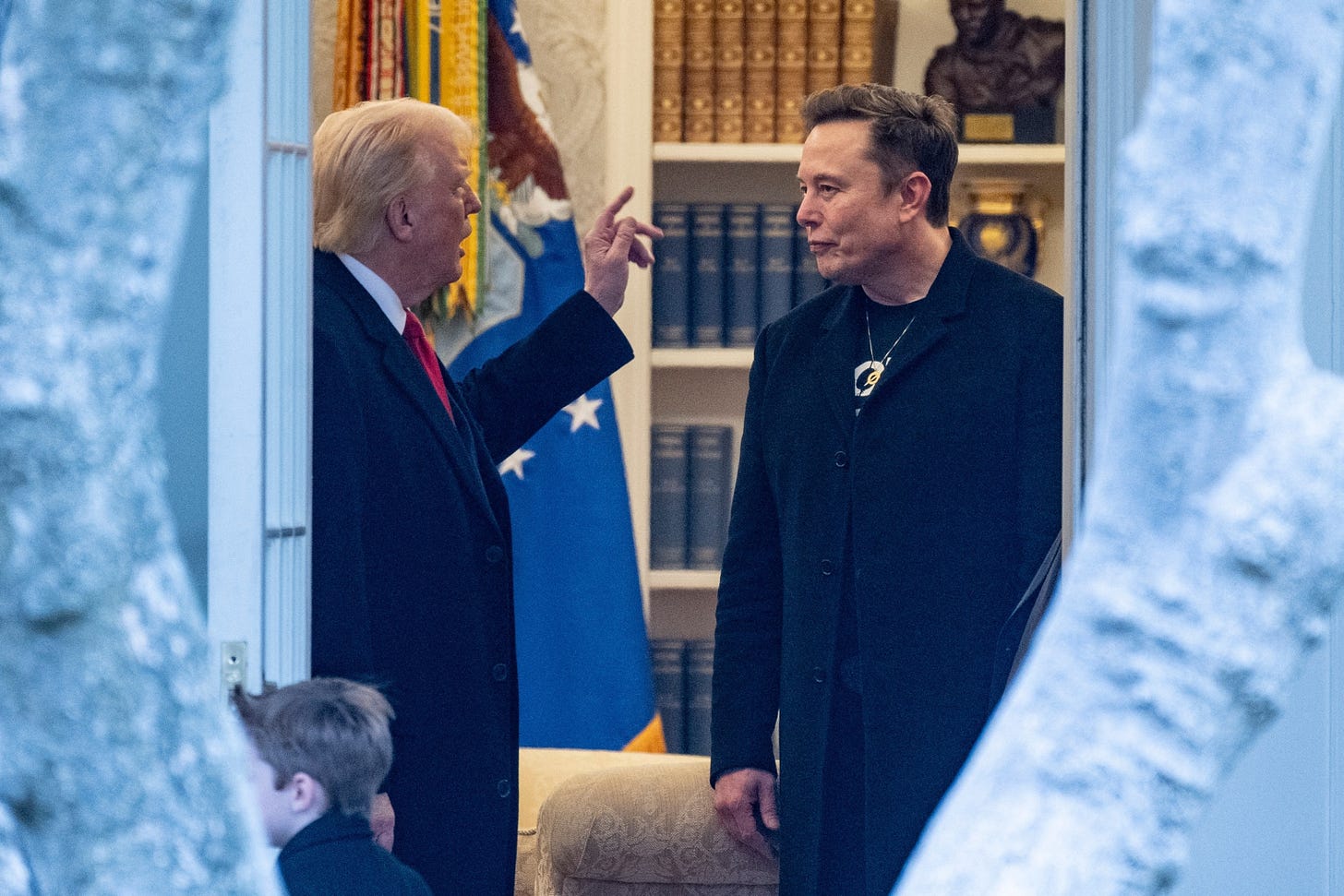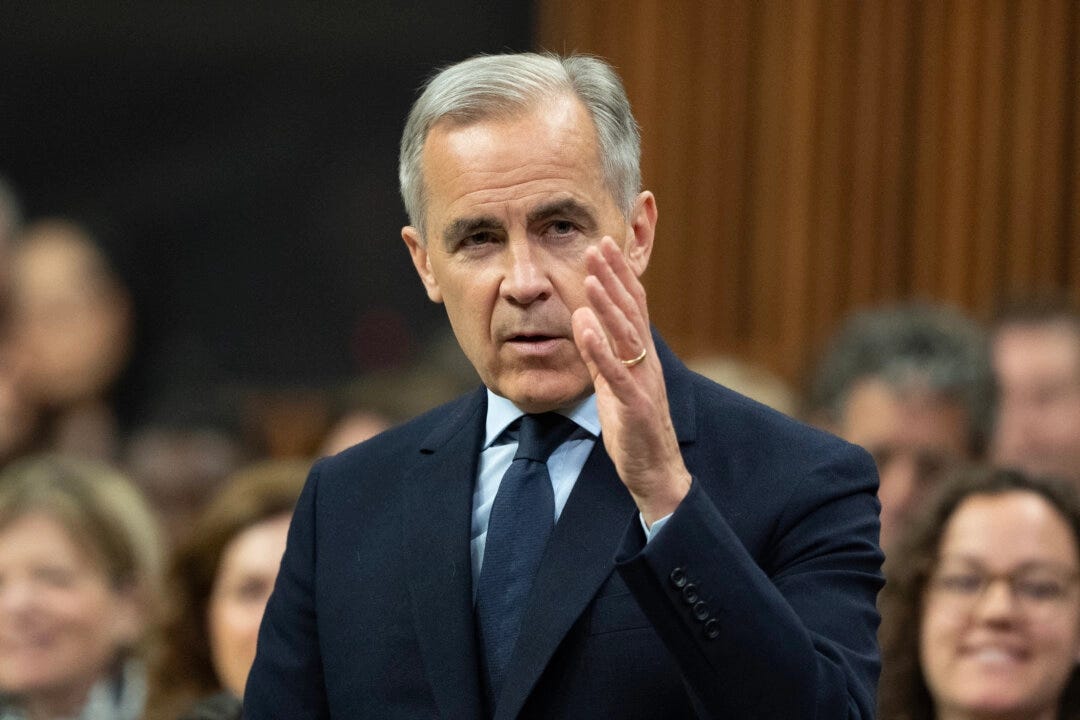Good morning, It’s Monday, June 9th. In today’s news, Trump warns Musk of “serious consequences” as rift with billionaire deepens, Carney unveils Bill to unify Canadian economy—critics say it lacks real reform, Apple, Amazon, and Spotify push back on Canada's cultural funding demands, Trump orders military to ‘Liberate Los Angeles’ amid riots, and much more.
First time reading the daily blend? Sign up here.
Trump Warns Musk of “Consequences” as Rift with Billionaire Deepens
The once-friendly relationship between Donald Trump and Elon Musk has turned hostile, with the U.S. president warning that the billionaire could face “serious consequences” if he backs Democrats in the upcoming midterm elections.
In a phone interview with NBC’s Kristen Welker, Trump made it clear he has no intention of repairing ties with Musk. Asked if their relationship was effectively over, Trump responded bluntly: “I would assume so, yeah.” He went on to say he’s “too busy doing other things,” adding, “I gave him a lot of breaks, long before this happened… I saved his life in my first administration.”
Trump’s warning comes amid growing speculation that Musk—CEO of Tesla, SpaceX, and owner of social media platform X—could throw his weight behind Democratic candidates. Trump didn’t specify what consequences Musk might face, but the implication was clear: as a major federal contractor, Musk’s companies could be vulnerable.
The feud erupted after Musk publicly denounced Trump’s new spending bill as a “disgusting abomination,” criticizing its projected impact on the federal deficit. Trump responded from the Oval Office, and the back-and-forth quickly escalated on social media, with Musk suggesting Trump should be impeached and accusing the government of hiding connections between Trump and Jeffrey Epstein—allegations Musk later deleted.
Vice-President JD Vance attempted to walk a fine line in a taped interview with comedian Theo Von. Vance called Musk’s attacks “a huge mistake,” but also praised his work as head of the Department of Government Efficiency, saying it had cut waste and helped streamline federal operations. “I hope that eventually Elon comes back into the fold,” Vance said, while also defending the spending bill Musk had targeted.
The bill, which extends Trump’s 2017 tax cuts, would also result in 10.9 million people losing health insurance and add $2.4 trillion to the deficit, according to the Congressional Budget Office. Vance acknowledged its flaws but said, “It’s a good bill. It’s not a perfect bill.”
With Musk now openly criticizing Trump, and Trump responding with threats and dismissals, the rupture appears serious—and could have lasting implications for both the tech and political worlds heading into 2026. Source.
Carney Unveils Bill to Unify Canadian Economy—Critics Say It Lacks Real Reform
Prime Minister Mark Carney recently introduced Bill C-5, the One Canadian Economy Act, a sweeping piece of legislation aimed at reducing internal trade barriers and accelerating the approval of major infrastructure and energy projects in Canada. The bill responds to mounting economic pressures, including US tariffs, and seeks to unify fragmented provincial regulations, streamline workforce mobility, and revive the country’s capacity to build large-scale, nation-building projects.
The proposed legislation is split into two parts:
The Free Trade and Labour Mobility in Canada Act, which allows goods, services, and workers certified under provincial or territorial standards to be recognized federally, easing the movement of trade and labour across jurisdictions.
The Building Canada Act, which introduces a “one project, one review” framework to cut red tape and reduce federal project approval timelines from five years to two. It emphasizes national security, economic benefit, Indigenous participation, and clean growth.
The bill also includes the creation of an Indigenous advisory council and a doubling of the Indigenous Loan Guarantee Program to $10 billion, aiming to ensure meaningful Indigenous ownership in major projects.
Criticism and Opposition Response:
Conservative Leader Pierre Poilievre acknowledged the direction of the bill but criticized it as too limited in scope. He argued the proposed measures would have “almost no impact” on removing interprovincial trade barriers and called for more aggressive incentives—such as financial bonuses for provinces and municipalities that dismantle trade restrictions.
Poilievre also raised concerns that the bill could allow “politically favoured projects” to bypass existing federal laws without addressing the root of the problem: the laws themselves. He advocated for a broader repeal of what he called growth-stifling regulations, including the federal impact assessment framework, the West Coast tanker ban, and the industrial carbon tax.
Another point of contention is the bill’s emphasis on provincial consensus for cross-border infrastructure. Poilievre warned that granting effective “veto” power to provinces could paralyze major projects like pipelines. He pointed to Alberta’s interest in a pipeline to Churchill, Manitoba—a project that could be blocked by BC’s opposition. In his view, this cedes Canadian energy opportunities to US markets, where infrastructure is built more swiftly.
Bill C-5 represents a meaningful attempt by the Liberal government to address Canada’s sluggish infrastructure development and internal trade inefficiencies. However, it falls short of delivering the scale of reform needed to unlock Canada's full economic potential, and it could reinforce provincial bottlenecks rather than eliminate them.
Apple, Amazon, and Spotify Push Back on Canada's Cultural Funding Demands
A showdown is brewing in Canadian courts as some of the world’s largest streaming companies—Apple, Amazon, Spotify, Netflix, and more—mount a legal challenge against a new Canadian Radio-television and Telecommunications Commission (CRTC) mandate requiring them to fund Canadian content. At stake is whether foreign streaming giants must contribute 5% of their Canadian revenues to support local media production, including TV news, under the newly empowered Online Streaming Act.
The streaming companies argue the order is both unfair and unlawful. Spotify calls the contribution a “tax” beyond the CRTC’s authority. Amazon says the regulation fails to meet the federal cabinet’s own requirement that the policy be “equitable,” pointing out that it singles out foreign companies with more than $25 million in Canadian revenue. Apple highlights the disparity between streamers (paying 5%) and Canadian radio stations (just 0.5%), despite limited access to the funding pool they’re expected to fill.
The Motion Picture Association-Canada, representing Netflix and others, is specifically challenging the rule requiring 1.5% of revenues go toward funding local news—despite none of the streamers producing or distributing news content. Their argument? Just because local news is struggling doesn’t mean foreign entertainment platforms should be forced to bail them out.
But the federal government and Canadian broadcasters see it differently. They argue that for too long, domestic broadcasters have carried the financial burden of supporting Canadian content, while foreign streamers have reaped the rewards of the Canadian market without contributing. With traditional broadcasters in decline and streaming platforms ascendant, the CRTC’s order is framed as a necessary recalibration to protect a collapsing media ecosystem. Source.
Trump Orders Military to ‘Liberate Los Angeles’ Amid Riots
On June 8th, President Trump ordered the deployment of National Guard troops to "liberate Los Angeles" amid violent protests over immigration raids by ICE. He accused the city of being overrun by "illegal aliens and criminals" and warned California officials, including Governor Newsom and Mayor Bass, not to interfere—or face charges. Despite pushback from Newsom over what he called an unconstitutional breach of state sovereignty, Guard troops were deployed near federal buildings, with tear gas and arrests reported. Trump also threatened to send Marines if unrest continues. The administration cited criminal arrests to defend its crackdown, while critics warned of escalating tensions. More
Canada Pushed to Co-Lead New Global Defence Bank That Could Help Boost Military
A new multilateral Defence, Security and Resilience Bank (DSR Bank) is being launched to help Canada and allied nations ramp up military spending amid rising global threats from countries like Russia and China. The bank aims to unlock up to $500 billion in capital by offering credit guarantees and loans to support defence industries, speed up procurement, and bolster NATO nations' defence budgets—potentially raising spending to 3.5% of GDP. The UK is poised to lead the initiative, but Canada is being encouraged to co-lead and host a branch in Toronto, which could create thousands of jobs. Retired Gen. Rick Hillier warns that Canada’s army is “broken,” citing urgent needs in equipment, staffing, and infrastructure, particularly in the Arctic and across military bases. More
Man With al-Qaeda Ties Arrested for Alleged Mass Killing Terrorist Threat in Montreal - More
Ontario Police Arrest 36 Men, Lay 128 Charges in Online Child Sexual Exploitation Investigation - More
Colombian Presidential Hopeful in Serious Condition After Being Shot in the Head at Campaign Rally - President Gustavo Petro ordered an investigation into the attack on Miguel Uribe Turbay, which authorities said was carried out by a minor under 15 years old. More
Israel Intercepts Gaza-Bound Aid Ship, Detaining Greta Thunberg and Other Prominent Activists - More
Iran Conducted Nuclear Weapon Implosion Tests, IAEA Reports; Chief Grossi Calls Tehran His Top Concern - More
AI is Coming for Your Job, Much Faster Than Anyone Thought
AI-driven layoffs are accelerating much faster than most predicted, with companies like Microsoft, IBM, and Meta cutting thousands of jobs as they shift to AI-first strategies. Experts warn that artificial general intelligence (AGI)—AI capable of human-like reasoning and learning—could emerge within the next five years, potentially disrupting all job sectors. Currently, entry-level white-collar jobs are most at risk: code generation, resume screening, legal research, financial analysis and content creation are all being automated today, with up to 50% potentially disappearing soon. This rapid AI advancement threatens widespread economic displacement, pushing society to face profound labour market changes sooner than expected. More
Atoms Over Oil: Westinghouse Pursues Massive US Nuclear Expansion After Trump Orders - More
Another Delivery System Disruption as DHL Express Canada Locks Out Workers and Union Strikes - The company says it has executed a 'contingency plan' to sustain operations while 2,100 truck drivers, couriers and warehouse workers across seven provinces are on strike. More
New Map Reveals 800,000 Galaxies—Shattering Theories of the Early Universe
The COSMOS-Web collaboration has released the largest-ever map of the universe, built using data from the James Webb Space Telescope. Spanning 13.5 billion years—98% of cosmic history—the map includes nearly 800,000 galaxies and is reshaping our understanding of the early universe. Scientists expected few galaxies from the universe’s first 500 million years, but JWST has revealed ten times more than predicted, including supermassive black holes previously unseen. The open-access dataset aims to democratize science and raise new questions about galaxy formation, dark matter, and the early cosmos. More
The Dogs of Chernobyl Are Experiencing Rapid Evolution - A study analyzed the DNA of 302 feral dogs living near the power plant, compared the animals to others living 10 miles away, and found remarkable differences. While the study doesn’t prove that radiation is the cause of these differences, the data provides an important first step in analyzing these irradiated populations, and understanding how they compare to dogs living elsewhere. More
Carlos Alcaraz Wins French Open Final in Five Sets After Saving 3 Match Points Against Sinner
Carlos Alcaraz pulled off a historic comeback to defeat Jannik Sinner in a five-set thriller, 4-6, 6-7(4), 6-4, 7-6(3), 7-6(10-2), and defend his French Open title. Saving three match points, Alcaraz claimed his fifth Grand Slam title in as many finals, handing Sinner his first major final loss in what became the longest French Open final ever. More
Summer McIntosh Sets World Record in 400M Freestyle at Canadian Swimming Trials - More
Ryan Fox Grinds Out Canadian Open Win Against Sam Burns on Fourth playoff Hole - More
Jared Leto Accused of Sexual Misconduct by 9 Women, Denies All Allegations - More
A Bizarre Trend Sweeping Through China Has Unemployed Youths Paying Fees to Pretend to Work in Rented Offices for Absolutely No Financial Gain
Ozempic Penis: Male Ozempic Users Say Ttheir Penises Have Gotten Bigger Since They Started Injecting the Weight-Loss Drug
On This Day in 2019, over 1 million people flooded the streets of Hong Kong in one of the city’s largest-ever protests, opposing a proposed extradition bill that would have allowed suspects to be sent to mainland China for trial. The massive demonstration marked a turning point in Hong Kong’s pro-democracy movement, igniting months of unrest and drawing global attention to Beijing’s tightening grip over the semi-autonomous city.



















Let's talk my new book.
https://youtube.com/shorts/hOthGHDBnig?si=KDMchpHRrLs1Eu9A